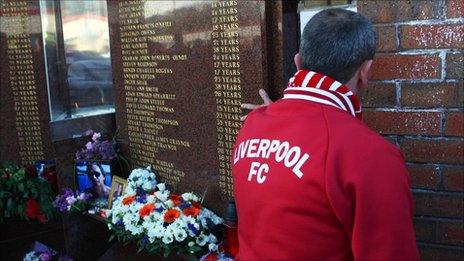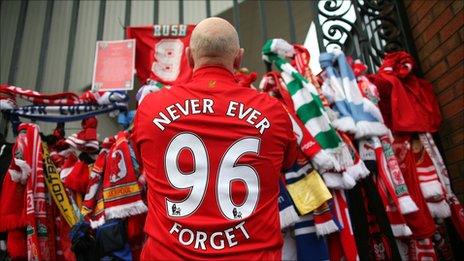Hillsborough files: Cabinet Office settles with BBC
- Published
- comments

The Cabinet Office and the BBC have reached a compromise in a long-running freedom of information dispute over documents relating to Margaret Thatcher and the Hillsborough disaster.
The government has promised to release these papers by June next year. On this basis the BBC is dropping its FOI application for them.
The Information Commissioner has also consented to this settlement. As a result the tribunal hearing scheduled to consider the government's appeal against disclosure in February next year will no longer happen.
The Cabinet Office has pledged that it will reveal the material by 30 June if it has not already been issued by the Hillsborough Independent Panel. This is the body set up to review and consider for publication most government records about the 1989 tragedy at the Hillsborough footbal stadium, in which 96 Liverpool fans were killed.
The BBC would like to see the information released as soon as possible, but has accepted this settlement on the basis that in practice it would only lead to a maximum delay of a few weeks.
Tragedy
The Information Rights Tribunal usually takes some weeks to issue a judgement and then gives the public authority another 35 days to comply with it. This means that even if in February the tribunal upholds the case for disclosure argued by the BBC and the Information Commissioner against the Cabinet Office appeal, the material would probably not be published until May 2012 anyway.
The case stems from an FOI application made by the BBC in April 2009, in which we asked for documents relating to cabinet and other discussions about Hillsborough involving the then Prime Minister Margaret Thatcher in the wake of the tragedy. Our request was turned down by the Cabinet Office but backed, external by the Information Commissioner who ruled that releasing the files would be in the public interest.
When announcing its plan to appeal against this, the government argued that all disclosures should be made by the independent panel, which it established several months after the BBC's FOI request. The panel says it intends to report next spring. However, cabinet records were outside the panel's terms of reference, external.
Damage
Some possible content of the documents involved is hinted at by outline arguments in a preliminary submission to the tribunal by the Cabinet Office this summer, at a time when the government was intending to proceed with its appeal against publication.
The Cabinet Office developed the argument it apparently previously presented to the Information Commissioner that releasing the material now could damage the public relationship with the police so much that even 22 years after the event the public would be less willing to co-operate with the police.
Its submission in August told the tribunal that "absence of controlled disclosure would be likely to focus public debate on the policing alone (rather than the full range of relevant issues) and cause greater damage to relations between the community and the Police."
The Cabinet Office went on to argue that rejecting the BBC's information request was necessary for the sake of "maintaining good relations between the police and the public" and "ensuring that the public co-operate with and assist the police."
Suspicions
The official Taylor inquiry into the causes of the tragedy blamed South Yorkshire Police for failures in crowd control that led to a fatal crush in the Liverpool fans' section of the ground.
This hint may fuel further suspicions among some campaigners about the police actions and what the government knew about them at the time. But at least matters should now become clearer by June next year.
The BBC's view is that the response of the government of the day to Hillsborough is an important matter of public interest. This can only fully be examined by the release of all relevant documents, including cabinet records that were outside the remit of the government's independent panel.
By pursuing this FOI request the BBC has ensured that some potentially crucial files will not remain secret. As a result the general public and those directly affected by the events should end up better informed about how the government reacted to the worst disaster in British sporting history.
- Published17 October 2011

- Published17 October 2011

- Published23 August 2011